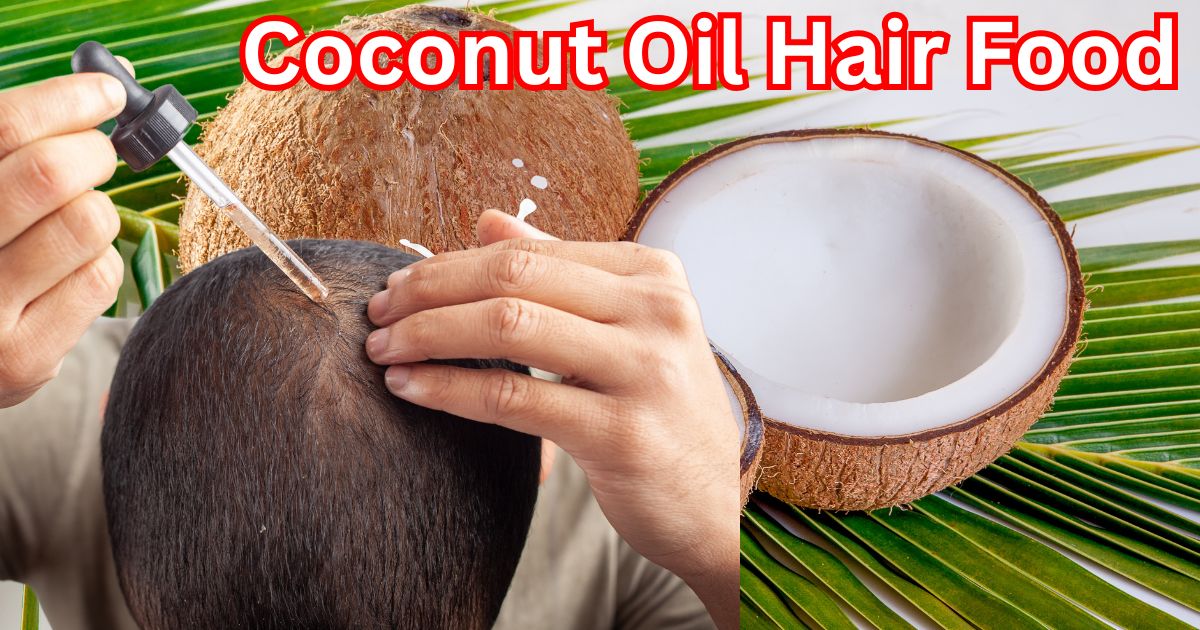Coconut oil hair food delivers nutrient-dense moisture that transforms dry, damaged strands into soft, vibrant hair.
You’ve tried countless products—but nothing gives you that lasting shine and frizz control.
It penetrates deeper than ordinary oils, repairing protein loss and boosting strength from the inside.
Still, picking the right formula and learning the right routine makes all the difference.
In this guide, you’ll discover expert tips, product comparisons, and pro-level application methods that take your hair routine to the next level—no guesswork, just results.
What Is Coconut Oil Hair Food?
You want nourishment, not just shine.
Hair food blends coconut oil with other enriching ingredients to deliver deep hydration and restore hair health.
Unlike pure coconut oil, which mainly moisturizes, hair food adds nutrients like vitamins and proteins for true hair nourishment and conditioning.
It differs from greasy pomades by providing a lighter, more absorbable treatment—think moisturizing treatment, not just slick finish.
Typical ingredients & formulations
Leading brands like Salon Pro combine coconut oil with sweet almond and olive oil to balance moisture and promote shine.
Garnier’s Coconut Hair Food includes coconut oil, shea butter, macadamia, and sunflower oil in a water-based emulsion for smooth absorption (LSI: hair nourishment, moisturizing treatment) .
Palmer’s formula boosts the nutrient profile even more—adding shea butter, cocoa butter, and vitamins A, D, and E to soften and fortify hair .
These blends pair emollients and humectants for multi-layered hydration, deeply conditioning without weighing strands down.
Benefits of Coconut Oil Hair Food
Tired of dry, brittle hair and uncontrollable frizz?
Coconut oil hair food locks in moisture and smooths the cuticle—exactly what coarse, textured, or heat-damaged hair needs.
Here’s how it works:
-
Coconut oil penetrates the hair shaft, not just coating the surface
-
Natural emollients seal in moisture, reducing water loss
-
Added oils (like almond or olive) enhance softness and shine
-
The result? Smooth, frizz-free hair that feels nourished—not greasy
Use it on damp hair after washing for best hydration, or apply a small amount to dry ends to tame flyaways.
Strength & Split-End Repair (protein-loss prevention)
Hair weak from heat styling, chemical treatments, or tight styles?
Coconut oil helps prevent protein loss, a key cause of breakage and split ends.
Here’s why:
-
It contains lauric acid, which binds to hair proteins
-
This reinforces the hair’s internal structure
-
Over time, strands become more resilient and less prone to snapping
Tip: Apply a small amount before shampooing as a pre-wash treatment to protect the hair cuticle during cleansing.
Scalp Health & Dandruff Relief
It’s not just for your strands—your scalp benefits too.
Coconut oil hair food soothes dry, itchy skin and creates a healthier environment for growth.
Benefits include:
-
Antifungal properties help combat dandruff-causing microbes
-
Oils like tea tree or peppermint (in some formulas) reduce inflammation
-
Massaging into the scalp boosts circulation and relieves tightness
Use fingertips—not nails—to apply to the scalp 2–3 times a week for best results.
Stimulating Growth & Edge Retention
Want longer, thicker hair and stronger edges?
Many users report faster growth and edge recovery after consistent use of coconut oil hair food.
Why it works:
-
Improved moisture means less breakage—so you retain length
-
Better scalp circulation = better follicle function
-
Strengthened hair holds up better under protective styles
Real talk: Growth takes time. But feeding your hair with nutrients gives it the best chance.
Apply along your hairline and scalp regularly, and stick with it. That’s how edges bounce back.
Coconut Oil Hair Food vs Coconut Oil Alone
Both work—but not in the same way.
Coconut oil hair food is designed for ease and enhancement. It blends coconut oil with other nourishing ingredients—like shea butter, almond oil, and vitamins—to deliver targeted results.
Use it when you want a balanced formula that moisturizes, strengthens, and tames frizz—all in one step.
Virgin coconut oil, on the other hand, is 100% pure and natural. No additives. No fragrances. Just raw hydration.
It’s ideal for deep conditioning, scalp massage, or a minimalist routine.
Refined coconut oil? Still moisturizing—but with fewer nutrients and less of that tropical scent. It’s more neutral and shelf-stable, but slightly less potent than virgin.
Quick takeaway:
-
Use hair food for daily styling and multitasking benefits.
-
Use pure coconut oil for intense treatments or when avoiding additives.
How to Choose the Best Product
Prioritize transparency—scan ingredient lists for coconut oil, shea butter, and vitamin E instead of unknown fillers.
Opt for USDA-certified organic or COSMOS-approved labels to avoid synthetic chemicals and embrace naturally derived nutrients.
Check for humectants like glycerin or aloe vera to ensure your hair stays moisturized and frizz-resistant all day.
Popular Brands/Products Reviewed
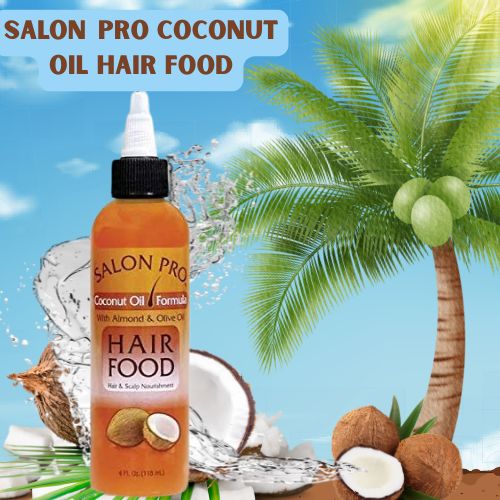 | 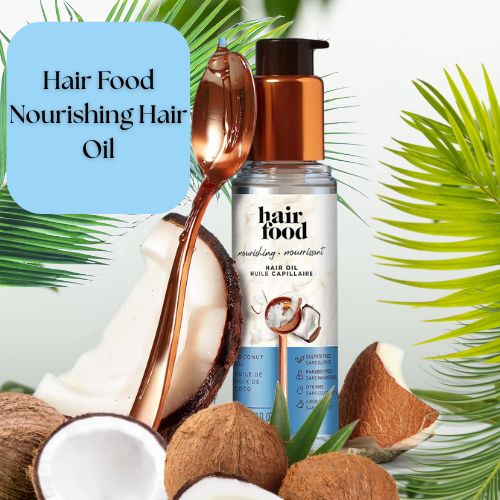 | 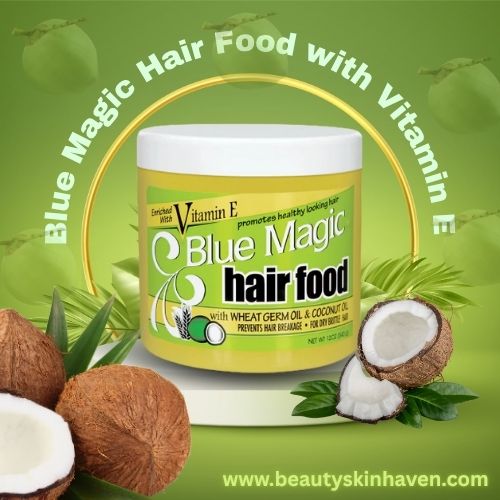 | 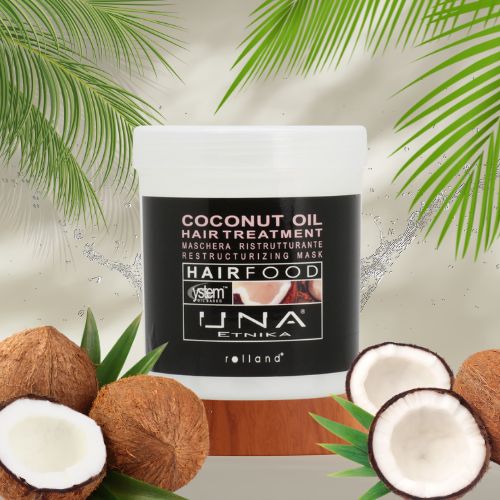 |
Salon Pro Coconut Oil Hair Food | Hair Food Nourishing Hair Oil | Blue Magic Hair Food Coconut | UNA Etnika Coconut Oil Hair Mask |
Salon Pro Coconut Oil Hair Food
This cult favorite mixes coconut oil with almond and olive oils to soften coarse, natural hair textures. Apply sparingly—just a pea-sized amount—to damp strands and avoid buildup.
Hair Food Nourishing Hair Oil
Formulated with coconut oil and macadamia for lightweight shine, it works beautifully as a heat protectant before blow-drying or straightening.
Blue Magic Hair Food Coconut
Rich and creamy, this classic blend delivers intense edge hydration. Massage it into your hairline nightly to retain edges without flaking.
UNA Etnika Coconut Oil Hair Mask
This premium mask blends virgin coconut oil with argan and castor oil. Use it as a weekly deep conditioning treatment—cover with a shower cap and rinse after 30 minutes for maximum hydration.
Price Range & Where to Buy — Budget ($3) to Premium ($20+)
Shop locally or online—budget-friendly brands like Salon Pro and Blue Magic cost around $3–$5 and scrub easily from store shelves.
Mid-tier options like Hair Food hit around $10–$15 and offer better ingredient transparency and fragrance options.
For premium formulations like UNA Etnika, expect $20+—but you get high-grade oils, Instagram-worthy packaging, and potent results.
Looking for fast value? Buy budget brands for daily use and reserve your splurge pick for weekly deep treatment.
How to Use Coconut Oil Hair Food
Before shampooing, apply coconut oil hair food to dry or slightly damp hair.
Focus on the mid-lengths to ends—this shields your strands from harsh sulfates or drying cleansers.
Leave it on for 15–30 minutes under a shower cap for a deeper conditioning effect. Some users even leave it overnight for max hydration (just protect your pillow).
Rinse thoroughly with warm water and follow with a gentle, sulfate-free shampoo.
Why it works: The oils create a protective barrier, reducing protein loss during washing and keeping moisture locked in.
Leave-In Styling or Edge Control
A dime-sized amount of coconut oil hair food doubles as a styling cream or edge tamer.
Rub it between your palms, then smooth over flyaways, split ends, or baby hairs.
For edge control, apply with a soft brush or fingertip and style gently—no tension needed.
Pro tip: Avoid applying too close to the scalp if you’re prone to buildup or greasiness. Focus on the ends and hairline.
Overnight Masks with Heat (Shower Cap Method)
Need intense repair? Go overnight.
Apply generously from root to tip, cover with a plastic shower cap, then layer with a bonnet or towel.
This traps body heat and helps the oils penetrate deeper into the hair shaft.
Wash out in the morning with a clarifying but gentle shampoo.
Use once a week for best results—especially if you use heat tools or chemical treatments regularly.
Frequency & Dosage for Different Hair Types
Fine or straight hair: Use a small amount (pea-sized) once or twice a week to avoid weighing hair down.
Curly or textured hair: Apply 2–3 times per week or daily to edges and ends, depending on your routine.
High-porosity hair (often color-treated or heat-damaged): Coconut oil hair food is your best friend—use it liberally, especially after wash days.
Rule of thumb: Less is more. Start small and build up as needed.
DIY Recipes & Natural Alternatives
Short on product? Mix your own.
-
2 tbsp virgin coconut oil (warmed)
-
1 tbsp raw honey
-
A splash of warm water
Whisk until creamy, apply to damp hair, and cover with a shower cap.
Leave on for 30 minutes, then rinse thoroughly.
Why it works: Coconut oil moisturizes, honey attracts water, and together they soften and strengthen.
DIY Blends with Neem/Jojoba/Almond for Scalp Concerns
Got dandruff or scalp irritation?
Create a custom blend:
-
2 tbsp coconut oil
-
1 tsp neem oil (antifungal)
-
1 tsp jojoba or almond oil (for extra softness)
-
Optional: a few drops of tea tree or rosemary essential oil
Massage into your scalp and let it sit for 20–30 minutes before rinsing.
Use weekly for relief from itchiness and flakes.
When to Choose Edible-Grade/Virgin Coconut Oil
Want total control over what goes in your hair?
Edible-grade, virgin coconut oil is pure and free from additives, preservatives, or fragrances.
It’s ideal for those with sensitive skin, allergies, or minimalists who prefer natural care.
Just scoop a bit from the jar, melt it in your hands, and apply as you would hair food.
Note: It lacks the added humectants or proteins found in commercial hair food—but it’s perfect for deep hydration and scalp massage.
Read Also:
Natural Hair Care Solutions:
👉 Benefits of Mango Oil for Hair
Real User Reviews & Testimonials
Across platforms like Amazon, Walmart, and Google Shopping, coconut oil hair food consistently scores 4.2 to 4.7 stars out of 5.
Most reviews highlight benefits like:
-
Noticeable softness after first use
-
Better manageability for curly and coarse hair
-
Pleasant scent without overwhelming fragrance
-
Budget-friendly results compared to salon treatments
Top-performing products like Salon Pro and Hair Food Nourishing Oil often appear in “Amazon’s Choice” or “Top Rated” sections.
Positive Outcomes – Frizz Reduction, Growth, Moisture Boost
“I saw a huge difference in my frizz by day 3. My curls clumped better, and I didn’t need gel,” says one verified Amazon reviewer.
Users with 4B and 4C textures often report that their hair feels softer, more pliable, and less prone to breakage after a week of use.
Another customer shared, “My edges are finally coming back after 3 months of protective styles and coconut oil hair food 2x/week.”
Hair growth testimonials cite improved length retention, thanks to reduced breakage—not magic.
Negative Feedback – Greasiness, Buildup
Of course, not everyone loves it.
Some reviewers found coconut oil hair food “too heavy” or “greasy, especially near the roots.”
Others mentioned product buildup when used daily or layered with other creams and gels.
Pro tip: Start with a small amount. If your hair feels waxy or limp, you’re likely over-applying or not clarifying often enough.
One common mistake? Applying too close to the scalp. Stick to ends and edges unless the product is designed for scalp use.
Side Effects & Precautions
Even natural products can cause reactions.
If you’re trying a new coconut oil hair food, always do a patch test first:
-
Apply a small amount behind your ear or on your inner elbow
-
Wait 24 hours
-
Check for redness, itching, or irritation
If you’re allergic to coconut or tree nuts (like almond or macadamia), read ingredient labels carefully or opt for alternatives like jojoba-based products.
Not Ideal for Low-Porosity Hair (Sealing vs. Penetration)
Coconut oil is highly occlusive—great for sealing in moisture, but not always ideal for hair that struggles to absorb water (aka low-porosity).
Signs your hair might be low-porosity:
-
Water beads on strands instead of soaking in
-
Products sit on top of hair rather than absorbing
-
Hair feels coated or waxy after oil treatments
If this is you, consider lighter oils like argan or grapeseed—or look for water-based formulas with humectants.
Storage & Expiry Tips
Coconut oil hair food can go bad—especially natural or DIY blends.
Follow these tips:
-
Store in a cool, dry place (away from direct sunlight)
-
Seal the lid tightly after each use
-
If it smells sour or the texture changes (grainy, separated), toss it
Most commercial versions have a 12–24 month shelf life. Check the PAO (Period After Opening) symbol on the jar.
FAQs + Final Verdict
Is coconut oil hair food good for daily use?
Yes, but in moderation. For most hair types—especially dry, textured, or chemically treated hair—daily use is safe when applied lightly to the ends or edges.
However, overuse can lead to buildup. Rotate with water-based moisturizers or apply only on wash days for best results.
Will it make my scalp oily or clog pores?
If you apply too much near the scalp, yes—especially for fine or low-porosity hair. Stick to mid-lengths and ends, or use scalp-specific formulas with lighter oils (like jojoba or peppermint-infused versions).
Always rinse thoroughly if using as a pre-shampoo treatment.
Can I use it on kids or color-treated hair?
Absolutely. Most coconut oil hair food formulas are gentle enough for children and safe for color-treated hair, but check the label for sulfates, parabens, or synthetic fragrances if you’re concerned.
Look for pH-balanced, non-stripping formulas if you’re protecting salon color.
Does it really help with hair growth?
Not directly—but it helps you retain length by reducing breakage, strengthening strands, and creating a healthy scalp environment. That’s the real secret to visible growth over time.
Use consistently, avoid harsh styling, and pair with a healthy routine for the best long-term results.
Final Verdict: Is Coconut Oil Hair Food Worth It?
Yes—especially if you’re tired of dry, dull hair that won’t behave.
Whether you’re a wash-n-go natural, relaxed, braided up, or heat-styler, coconut oil hair food delivers multi-benefit nourishment without breaking your budget.
Here’s why it stands out:
✅ Seals in moisture
✅ Reduces frizz and breakage
✅ Conditions without heaviness (if applied right)
✅ Doubles as a pre-poo, edge tamer, and overnight mask
Best for:
-
Type 3 and 4 textures
-
Dry or chemically processed hair
-
Protective style maintenance
-
Budget-conscious shoppers who still want results
Less ideal for:
-
Low-porosity hair (unless used sparingly)
-
Those seeking completely fragrance-free products

Mahian is our dedicated hair growth and hair oil content writer, with years of experience creating in-depth guides on natural hair treatments, oil applications, and hair care routines. Through extensive research and content creation in the hair growth niche, he has developed a deep understanding of various hair oils, their benefits, and practical usage tips. His writing covers everything from traditional oiling methods to ingredient spotlights, helping readers navigate the world of hair growth solutions. Mahian’s passion for the subject and commitment to thorough research make him a trusted voice for anyone looking to improve their hair health through natural methods.

